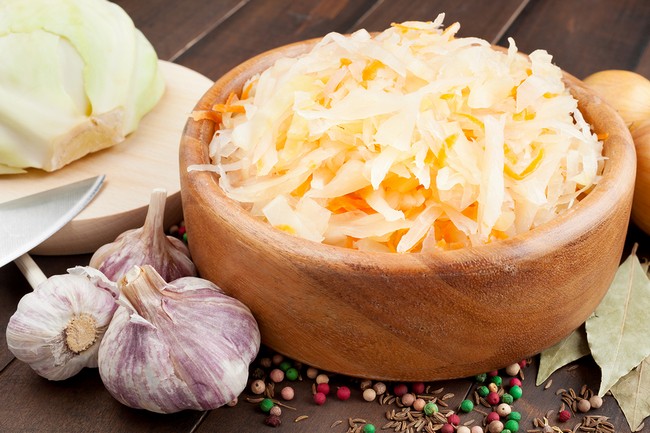- Make It Yourself Lavender Heart-Shaped Bath Bombs!
- 20 Things You Never Knew About “Down There”
- 12 Best Foods For Those Suffering From Arthritis Pain
- 12 Personal Hygiene Mistakes Almost Everyone Makes (Mom Never Told You About #4!)
- 15 Medicinal Plants And Herbs From The Cherokee People
- 12 Mind-Blowing Benefits Of Drinking Coconut Water During Pregnancy
- 12 Outstanding Winter Foods That Won’t Fatten You Up Like A Christmas Turkey
Pump Up Your Immune System With These Probiotic Foods!

Photo credit: bigstock.com
6. Sauerkraut
This dish of fermented cabbage comes to us from Germany. This is one of the oldest traditional foods of Europe. Sometimes served as a side dish, it is often mixed with sausage or cooked pork meat. It can be a bit on the salty side but has a sour taste most people love. Sauerkraut is loaded with fiber, vitamin K, C, B, iron, manganese, and, of course, probiotic bacteria. This fermented cabbage also has two important antioxidants for healthy eyesight, zeaxanthin and lutein. Always choose unpasteurized sauerkraut as the pasteurization process kills the probiotic bacteria.
7. Traditional Buttermilk
There are two types of buttermilk, cultured and traditional. Traditional butter milk is nothing more than the leftover milk that comes when butter is made. This type of buttermilk is the only kind that has probiotics. Some people call this Grandma’s buttermilk or Grandma’s probiotic buttermilk. This kind of buttermilk is very difficult to find in America. You might want to try making your own butter (it is wicked easy to make!). This way, you will have your own source of buttermilk.
The other type, cultured buttermilk, is what is traditionally sold in America today. It has no probiotics as it has been pasteurized.
8. Tempeh
This is another soy bean product that is from Indonesia. Tempeh makes a type of patty that tastes similar to mushrooms. This is often what vegans consume as “hamburger” patties and has become quite popular throughout the world. Soy beans are high in a compound called phytic acid, a substance that inhibits the body from absorbing minerals such as zinc and iron. However, once soy beans are fermented, it greatly reduces the amount of phytic acid in the plant, which means the body can absorb more of its minerals. Tempeh is also one of the few sources of vitamin B12, something most vegans do not get enough of.
Continue to Page 5
































